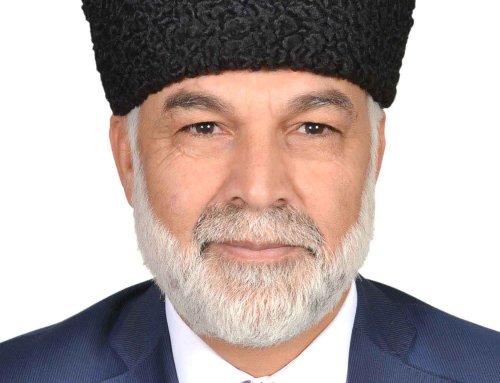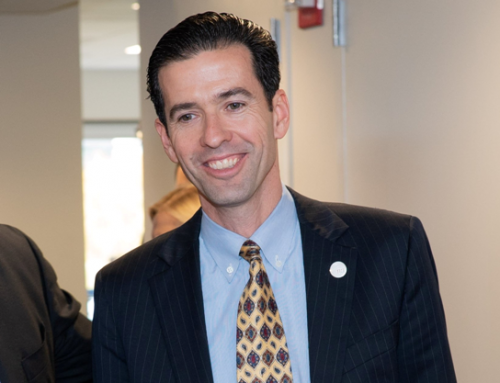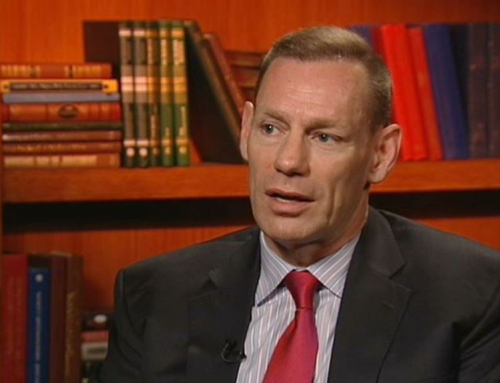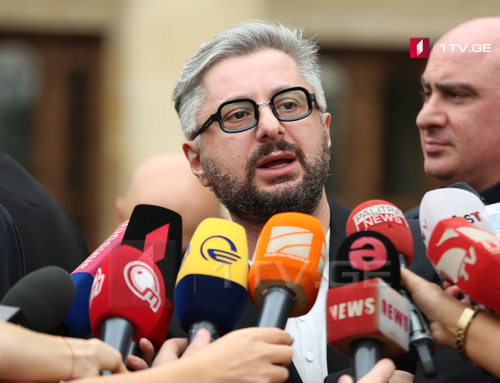
Deputy Minister of Justice Alexandre Baramidze explains how the government will repair the court system. (Interpressnews.)
Deputy Minister of Justice Alexandre Baramidze says that there are many regulations in the current judicial system which contradict the Georgian constitution and international human rights principles. The reform of the court system which the Ministry of Justice has started aims to solve this problem. At first, the reform foresees a number of legislative amendments.
A.B: We think of judicial reform to be implemented in several stages. We have already presented to the parliament a draft bill of amendments to four laws and this is what we are going to do in the first stage. We named this stage the ‘institutional reform of the judicial system.’ We have decided to start from the reorganization of the High Council of Justice, conference of judges, administrative committee of conference of judges and the high school of justice.
Those are very important institutions in the judicial system. For example, the High Council of Justice has some crucial powers, as this the body that appoints and fires judges. It really matters who are members of the Council and how democratic the rules for electing those members are. Moreover, together with all its other functions, this body has responsibility for launching disciplinary proceedings against judges.
Presently, there are 15 members in the High Council of Justice, and it is chaired by the Chairman of the Supreme Court of Georgia. This is what is provided for by the Constitution. However, in addition to those two crucial positions, the Chairman of the Supreme Court holds three more offices in the judicial system. As a matter of fact, he holds five official positions in total: in addition to being the president of the Supreme Court and the High Council of Justice, he also chairs the conference of judges (which is declared to be a self-government body of judges, but in fact this body cannot implement self-governance) and the administrative committee of the conference of judges and also is a chairman of the Board of the High School of Justice.
But let us get back to the composition of the High Council of Justice: eight members are elected by the conference of judges, the parliament appoints four members from its own members and two members are appointed by the President of Georgia. We are proposing to amended the regulations in terms of both electing judge-members and non-judicial members of the High Council of Justice. In our opinion, we have made some very significant changes to the rules for electing judge-members. Presently, those eight members are elected by the conference of judges, but the rule is a very undemocratic one having nothing to do with self-government. The Chairman of the Supreme Court has exclusive power to propose candidates and no-one else has a right to nominate candidates.
It is worth of noting that this co-called self-governing body has to vote openly, i.e. by raising hands. This means that the judicial conference is under the dictate of the Chairman of the Supreme Court, as the highest official of the court hierarchy and the chair of this body has an exclusive privilege to propose candidates. It is therefore important to change this rule.
One more curious thing to mentionis the identity of candidates the Chairman of Supreme Court used to propose to the conference of judges. If one takes a look at the current composition of the High Council of Justice, as well as that of the recent past, one will discover that if not all of them, a big majority of judge members have been either chairmen or deputy chairmen of courts, or chairmen of the chambers or the panels of courts. This means that the Chairman of the Supreme Court only proposed candidates holding some leading administrative positions in the judicial system. Is there anyone who would think that this is fair?
DFW: How can you explain this?
A.B: It is interesting to know why; maybe because they have been close to him and with their assistance he could effectively control the whole corpus of judges?
There haven’t been any opportunities for ordinary judges to make their way to the High Council of Justice. That’s why we decided to deprive the Chairman of the Supreme Court the exclusive right to nominate candidates for the High Council of Justice and to give this right to any person attending the conference of judges. In addition, we are going to replace the rule of open vote by secret ballot and we are also proposing to the Parliament to make the chairmen of courts, their deputies and other officials having administrative functions in courts ineligible to run for membership of the High Council of Justice.
DFW: Isn’t this restriction discriminatory? The Chairman of the Supreme Court argues that banning candidates that hold some administrative positions in the judicial system is discriminatory and doesn’t comply with EU standards.
A.B: This doesn’t have anything to do with discrimination. If you take a look at the relevant constitutional regulations or those of international human rights law, you will see that there is no rule prescribing that if a person holding any official position doesn’t have the right to hold another official position, then this is considered to be a discrimination. What we are dealing with in this situation is called incongruity of official positions, a concept which may be found in all systems of law across the globe.
In our system of law, there are many official positions that may not be occupied simultaneously with any other positions. This rule is common in public service and if it works well in the executive branch why should it be different in the judicial branch? And, after all, why should [Kote] Kublashvili be entitled to hold five crucial offices at the same time? It really doesn’t have anything in common with discrimination. It is simply inappropriate from the standpoint of law and justice.
Furthermore, a similar prohibition already exists in the current law. Specifically, the organic law on common courts sets forth exactly the same ban for members of the administrative committee of the conference of judges. This ban was designed by the brother of Kublashvili, a former chair of the parliamentary committee for legal affairs. Under that rule, no chairman of any court, or his/her deputy, or chair of chamber or the panel may be elected a member of the administrative committee.
We did not invent a bicycle. It already exists. We just expanded it to the High Council of Justice. And I am asking, if this ban was not discriminatory for the members of the administrative committee and the Kublashvili brothers liked it for such a long time, why it is discriminatory for the members of the High Council of Justice? Where is the logic here?
DFW: The Chairman of the Supreme Court also remarks that giving all judges a right to nominate candidates for the High Council of Justice would complicate the procedure so that it may fail.
A.B: This assumption is also groundless, as our bill also foresees that if more or less than eight candidates collect necessary amount of votes, this problem will be easily solved – the first eight persons having the best results will occupy the eight seats in the Council. If less than eight persons receive the necessary number of votes, then a second round will be be held for the vacant seats and just one fourth of the votes will be enough in that second round.
So, there is no problem here, unless anyone wants to arrange a sabotage on purpose and to force every member of the conference of judges not to vote. I don’t know what some people are going to plan there, but within the frames of normal election process and fair attitudes, there shouldn’t be any kind of problems.
DFW: Your opponents do not like that part of the draft by which the current members of the High Justice Council will be terminated and they will only fulfill duties of a member until the new Council is composed under the new regulations. Their argument is that they are legitimately elected members under the current law and the new rules shouldn’t apply to such members until their term is over.
A.B: What does “legitimately” mean? It means something which is lawful. Maybe someone, especially proponents of the previous government, thinks that anything which is written in the law is lawful. You may not write in the law anything you like. That’s what they were doing when they were in power. No, not everything you may think of is lawful just because you have written it in the law.
Law has a hierarchical structure. The constitution stands on the top of this hierarchy, and eternal and universal principles of law stand even higher, including universally recognized principles of human rights. And each particular norm should be in line with higher norms and eventually with those universal principles of law. If any particular provision of law contradicts those principles, it cannot be considered to be ”legitimate” or “lawful”.
This is one of the key principles of a state based on the rule of law. Again, if any norm of domestic law contradicts these principles, we cannot consider them to be legitimate.
Now I may ask you, if the Chairman of the Supreme Court, who also holds four other key positions in the judicial system and also has an exclusive power to propose candidates for membership of the High Council of Justice to the so-called self-government body of judges, and if the judge members of that “self-government body” have no other choice but to approve his proposal by raising their hands, showing thereby loyalty to their boss, can we really say that members elected this way are legitimately elected ones? What does this process have in common with democracy and the rule of law? And what kind of “legitimacy” are we talking about here?
Accordingly, if we agree that such rules are in conflict with the principles of rule of law, than we must conclude that the members elected under such illegitimate rules cannot be considered legitimate. So, it does not matter that Mr Kublashvili’s brother has written such unlawful rules in the law. That fact by itself does not make those illegitimate norms legitimate. Accordingly, the conclusion of our logic is that everything that is not legitimate should be abolished.
DFW: Why should the president be deprived of his power to appoint members of the High Council of Justice?
A.B: Because the president is a representative of the executive branch. It does not matter that by the initiative of Kublashvili brothers, he no longer is called “head of the executive” buyt instead “head of state”. In fact, by his functions, under the current constitution, he is a top official of the executive government. The executive government should not interfere in the judicial system. Nor should a legislative body or its members, I mean political figures, have seats in the High Council of Justice.
That’s why we propose that parliament should have the power to elect all six non-judge members of the High Council of Justice, but not from its own members as it stands now, but among representatives of the public. Faculties of law, civil society organizations and the Georgian Bar Association will be authorized to nominate candidates from among their members. We think this is a good rule because where the public does have any influence or control over the activities of the High Council of Justice, there will be no confidence in the judicial system and the degree of democracy and justice will be low.
In addition, we are proposing some strict criteria which should be met by the candidates for the High Council of Justice. First of all, the age threshold will be raised from 25 to 30 years. It is important that a candidate should be an accomplished lawyer and should have a certain life experience. Furthermore, this should be a recognized person of his/her field and it should be a person of high moral standing.





Leave A Comment
You must be logged in to post a comment.